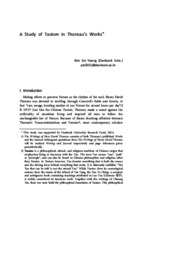

-
미리보기
서지정보
· 발행기관 : 한국비교문학회
· 수록지 정보 : 비교문학 / 63호 / 213 ~ 239페이지
· 저자명 : 김의영
초록
On the thesis entitled “The Puzzle of Taoism in Thoreau’s Works” in Comparative Literature, Vol 60, I have tried to demonstrate the assumption that Thoreau must, in one way or another have been acquainted with Taoist literature and thus integrated Taoist principles into his own thoughts and writings. In spite of acknowledging these striking affinities between Thoreau and Taoism, most critics ruled out the possibility that Thoreau might have been familiar with Taoist works. It was because certainly Thoreau makes no reference to this school or its representatives directly or indirectly. For this reason, when they professed to discuss the relationship between Thoreau’s philosophy and Taoism, they have ascribed it to mere coincidence rather than influences. In order to correct this erroneous scholastic attitudes toward Thoreau's Taoism, on the previous thesis, I have focused on proving that the affinities between Thoreau's and the Taoists' thought is as the result of his enthusiastic reading of the Taoists' works. To do so, the direction of my study was concentrated on collecting several convincing pieces of evidence showing the process of how and when Thoreau became familiarized with Taoist literature. During his college days, Thoreau first read about Rémusat’s study of Lao Tzu in Victor Cousin’s Introduction to the History of Philosophy, and that in the periods between the 1810s and 1840s, Rémusat translated a number of versions of the Tao Te Ching into French, which were definitely accessible to Thoreau. Furthermore, through Pauthier's footnotes in Les Livres Sacrés de l’Orient, Thoreau not only learned of Lao Tze and his Tao Te Ching, but also grasped the essential notion of Taoism from the translater's comparison between Confucianism and Taoism.
In order to give more concrete shape to the reasoning that Thoreau must have been influenced by Taoism, this study focused on investigating how the main philosophic principles of the Taoists― Wu-Wei Zi-Ran(無爲自然): letting nature be, leaving nature as it is. Nature itself remained intact― were assimilated with Thoreau's Transcendental Idealism. While describing less-known but significant sources of Thoreau's Taoism from a comparative perspective, the argument that Lao Tzu exerted influence on Thoreau seemed, in my view, fairly established. To analyze their affinities from a comparative perspective, some significant parallels between the Taoists' and Thoreau's thoughts, specifically, their similar mystical conceptions of Nature, their interesting symbolism of water, the ideas of living simply in harmony with nature and their refusals of the unjust policy of the government and the political institution of man were investigated. Like the Taoists, who used the metaphor of water to express their idealism of Wu-Wei Zi-Ran(無爲自然), for example, Thoreau metaphysicized water as the ontological equivalent― as the symbol of a living and a life-giving part of nature. Like Lao Tzu and Chuang, while he used the metaphor of water to express his Transcendental ideas, Thoreau showed an endearing reverence toward water. Like the Taoist, to Thoreau, water was an emblem of the highest good, or the Tao. Like Chang Tzu, who described water as a perfect mirror to recover his spirit of all the dross and corrupting matter which encrust him, Thoreau likened the mind of the Transcendental self to a mirror of water. The segments of evidence that have been demonstrated, in my view, are sufficient to conclude that Thoreau must, one way or another, have been acquainted with Taoism. and that, therefore, the Taoist ideas should be treated as "influences" rather than "parallels." It is hoped that the arguments I have mentioned above have offered sufficient evidence to repudiate the casual claims that the influences of Taoist thought are tangential.참고자료
· 없음태그
-
자주묻는질문의 답변을 확인해 주세요

꼭 알아주세요
-
자료의 정보 및 내용의 진실성에 대하여 해피캠퍼스는 보증하지 않으며, 해당 정보 및 게시물 저작권과 기타 법적 책임은 자료 등록자에게 있습니다.
자료 및 게시물 내용의 불법적 이용, 무단 전재∙배포는 금지되어 있습니다.
저작권침해, 명예훼손 등 분쟁 요소 발견 시 고객센터의 저작권침해 신고센터를 이용해 주시기 바랍니다. -
해피캠퍼스는 구매자와 판매자 모두가 만족하는 서비스가 되도록 노력하고 있으며, 아래의 4가지 자료환불 조건을 꼭 확인해주시기 바랍니다.
파일오류 중복자료 저작권 없음 설명과 실제 내용 불일치 파일의 다운로드가 제대로 되지 않거나 파일형식에 맞는 프로그램으로 정상 작동하지 않는 경우 다른 자료와 70% 이상 내용이 일치하는 경우 (중복임을 확인할 수 있는 근거 필요함) 인터넷의 다른 사이트, 연구기관, 학교, 서적 등의 자료를 도용한 경우 자료의 설명과 실제 자료의 내용이 일치하지 않는 경우
“비교문학”의 다른 논문도 확인해 보세요!
-
마술적 리얼리즘의 범 주변부적 편재의 양상– 가르시아 마르케스, 응구기, 황석영, 오 카인 비교 연구 29 페이지
Today a sizable literature of the margin does appear in the consequence of interaction with local tradition and global literature. Magical realism might be a kind of literary movement for the local to.. -
Exoticism, Fin de Siècle, and Representation of Asian Women in Late Ni.. 22 페이지
This article is a study of the origin and the historical development of the Madame Butterfly narrative as the dominant representation of Asian women in Western culture, which was part of the cultural .. -
하이퍼리얼 ‘저지기계’로서의 스캔들 그리고 아이러니 - 장 보드리야르의 시뮬라시옹 질서를 중심으로 33 페이지
This essay will apply Jean Baudrillard`s analytical frame for the 'Scandal' as deterrence machine of the hyperreal to conceal the absurdity of world and the 'Irony' on the whole led to from it. Accord.. -
조선후기 농가시와 경직도의 복합적 양상 비교 25 페이지
This paper aims at searching for the comparative features of traditional agricultural poetry and paintings in late Joseon dynasty. Korean traditional culture shows a lot of agricultural things because..
문서 초안을 생성해주는 EasyAI

